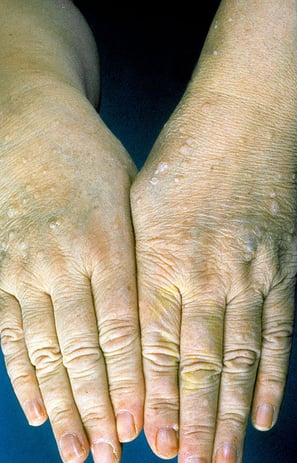Cowden Syndrome: Causes, Symptoms, Diagnosis, and Treatment
Cowden syndrome (CS) is a rare genetic disorder characterized by the growth of multiple noncancerous tumors (hamartomas) and an increased risk of developing certain cancers. Named after the first patient diagnosed with the condition, it is associated with mutations in the PTEN gene, which plays a crucial role in cell growth regulation. While rare, understanding Cowden syndrome is essential due to its implications for early cancer detection and prevention.
ONCOLOGYGASTROINTESTINAL
Rishwin A R
3/4/20253 min read


Causes
The primary cause of Cowden syndrome is a mutation in the PTEN (Phosphatase and Tensin Homolog) gene, located on chromosome 10. This gene functions as a tumor suppressor, helping regulate cell division and prevent uncontrolled growth. When PTEN is mutated, the body loses its ability to control cell proliferation, leading to the formation of hamartomas and increasing cancer susceptibility.
Risk Factors
Genetic inheritance – CS follows an autosomal dominant pattern, meaning an affected parent has a 50% chance of passing it to their child.
De novo mutations – In some cases, individuals develop the mutation spontaneously without inheriting it from parents.
Symptoms
Cowden syndrome presents a broad range of symptoms, primarily involving the skin, mucous membranes, gastrointestinal tract, and endocrine system. The most common signs include:
Dermatological Manifestations
Trichilemmomas – Small, benign wart-like growths on the face, especially around the nose and mouth.
Acral keratoses – Rough, wart-like lesions on hands and feet.
Oral papillomas – Small, flesh-colored bumps inside the mouth.
Lipomas and hemangiomas – Fatty or blood vessel tumors appearing on the skin.
Other Key Features
Macrocephaly – Enlarged head circumference, often exceeding the 97th percentile.
Thyroid abnormalities – Benign thyroid nodules or thyroid cancer.
Breast abnormalities – Fibrocystic changes, increased breast density, and elevated risk of breast cancer.
Gastrointestinal polyps – Noncancerous polyps that may cause digestive issues.
Neurodevelopmental concerns – Intellectual disability or autism spectrum disorder in some cases.
Associated Cancer Risks
Individuals with Cowden syndrome face a significantly higher risk of developing certain cancers than the general population. The most commonly associated cancers include:
Breast cancer – Up to a 50-85% lifetime risk.
Thyroid cancer – Primarily follicular thyroid carcinoma.
Endometrial cancer – Affects the uterus, with an increased lifetime risk.
Colorectal cancer – Often associated with polyps in the digestive tract.
Renal (kidney) cancer – Less common but still a notable risk.
Diagnosis
Diagnosing Cowden syndrome involves a combination of clinical evaluation, genetic testing, and imaging studies.
Clinical Criteria
Doctors assess Cowden syndrome based on specific diagnostic criteria, including the presence of multiple hamartomas, macrocephaly, and a family history of related cancers.
Genetic Testing
A PTEN gene test confirms the diagnosis by identifying mutations responsible for the condition.
Additional Tests
Depending on symptoms, additional tests may include:
Thyroid ultrasound – To detect nodules or cancer.
Mammography/MRI – For breast cancer screening.
Colonoscopy – To monitor for polyps and colorectal cancer.
Endometrial biopsy – To assess uterine cancer risk.
Treatment and Management
While there is no cure for Cowden syndrome, management focuses on regular screenings, preventive measures, and symptom control.
Surveillance and Preventive Care
Due to the high cancer risks, routine monitoring is crucial. Recommendations include:
Annual breast exams and imaging (MRI/mammogram) starting in early adulthood.
Thyroid ultrasound every 1-2 years.
Colonoscopy every 5 years starting at age 35 or earlier if polyps are present.
Endometrial screening for women at high risk.
Medical and Surgical Interventions
Preventive mastectomy – In high-risk breast cancer cases.
Thyroidectomy – If cancerous nodules are found.
Polyp removal – To prevent colorectal complications.
Lifestyle and Support
Healthy diet and exercise – Maintain overall well-being.
Genetic counseling – Essential for affected individuals and their families.
Psychosocial support – Managing the emotional impact of lifelong monitoring.
Conclusion
Cowden syndrome is a rare but serious genetic condition that requires lifelong vigilance and proactive care. With early diagnosis, regular screenings, and appropriate medical intervention, individuals with CS can manage their health risks effectively. If you or a family member have symptoms of Cowden syndrome, consulting a genetic specialist can be a crucial step toward early detection and prevention.
Frequently Asked Questions (FAQs)
1. Is Cowden syndrome life-threatening?
Cowden syndrome itself is not fatal, but it significantly increases cancer risk, making early detection and preventive care essential.
2. Can Cowden syndrome skip generations?
No, since it follows an autosomal dominant inheritance pattern, an affected parent has a 50% chance of passing the mutation to each child.
3. At what age does Cowden syndrome typically appear?
Signs can appear in childhood or adolescence, but the condition often remains undiagnosed until adulthood when cancer risks become evident.
4. How rare is Cowden syndrome?
It affects approximately 1 in 200,000 individuals, making it a rare disorder.
5. Can Cowden syndrome be prevented?
While the genetic mutation cannot be prevented, regular screenings and proactive care can help manage risks and prevent complications.
Yannick Trottier, CC BY-SA 3.0, via Wikimedia Commons
Syndromes.xyz
Explore medical syndromes and their details here.
For Educational purposes only
The information on this site is not in any way, replacement for professional advice. Always consult your physician regarding personal queries
Connect
Support
syndromesxyz@gmail.com
© 2024. All rights reserved.
